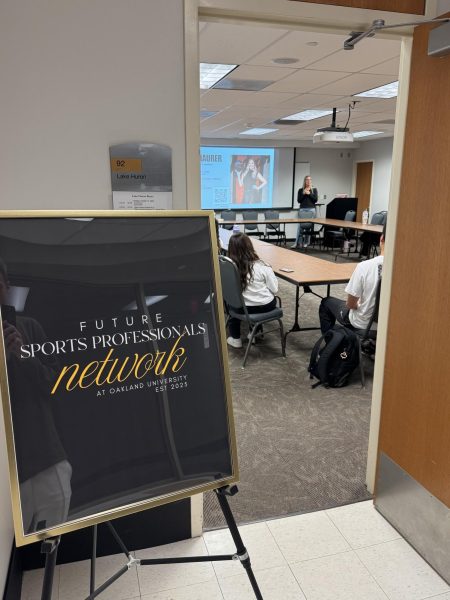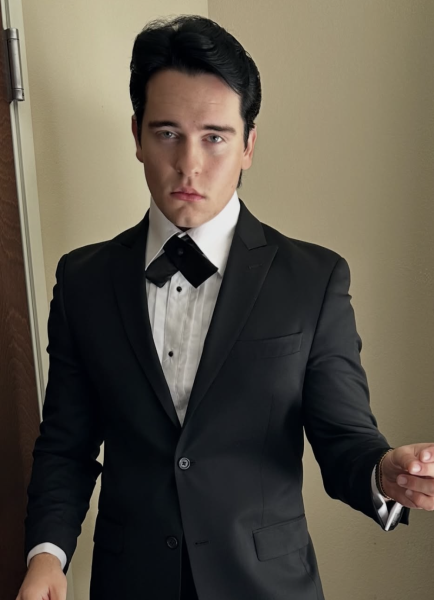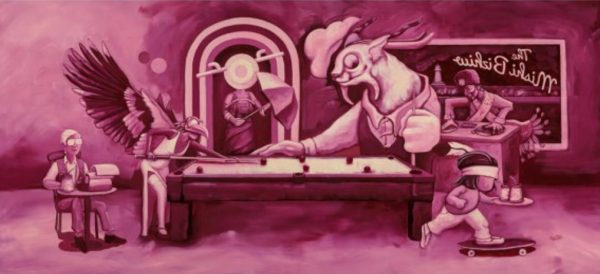Black Lives Matter panel sparks open discussion
In the basement of the Oakland Center, students, faculty and alumni came together to discuss a major social movement that focuses on problems that plague the African-American community: Black Lives Matter.
The Association of Black Students hosted the panel as an event for African American Celebration Month. The mediators for the event were ABS’s president, junior Danicea Woods-McSwain, and treasurer, senior Michael Scarborough.
At the discussion, students talked about problems among the black community: police brutality, black-on-black crime, the high imprisonment rates of African-American males and cultural appropriation.
The panel was an open discussion during which people could freely speak. On the topic of police brutality, sophomore Kenneth Walton discussed his experience with the police when he lived in Alabama.
“I was asleep in the car, in the back seat, doing nothing, when I woke up with a gun in the window already,” he said. “What does compliance have to do with that? I haven’t even said anything yet. If I jump, I’m getting shot. It’s the fear. Some of these things that’s been going on for so long has almost become a reality to people. You can’t really change that generation of people, but you have to move forward with the next generation.”
ABS executive board member, freshman Sean King, shared his experiences with police in his community.
“I’m still seeing my fellow brothers getting shot,” King said. “There’s constant videos of us not resisting and stuff, but we’re still getting shot in the chest, shot in the head. I got a gun pulled out at me in front of my face with me and my friends for simply doing nothing.”
Many people who attended the panel voiced their opinions on the oppression and stereotypes of not only black people, but all people of any color. Sophomore Ch’nel Skelton compared the cultural stereotypes to the movie “Dear White People,” in which the clothing styles many African-American males wear are exaggerated by white students during a house party.
“On [white people’s] point of view they’re thinking ‘I’m supporting the things that I’ve seen that you portray as black people,’” Skelton said. “Black people look at that like, ‘get out, what are you doing?’ It’s not acceptable because they’re taking it too far. Making it look like some sort of character out of a cartoon.”
Senior Elijah Grant believes that stereotyping not only happens to black people, but Caucasian people as well.
“Whenever I see a white person, my first thought is ‘white privilege,’ Grant said. “We have to step back and own up to our own stereotypes, because I really do do that sometimes. I have to check myself and say, ‘OK, you don’t know anything about this person, and I would hate for it to be vice versa because you don’t know anything about me, what I’ve been through, where I come from, anything, my test, trials and tribulations.’ So, I really think we need to step back and own up to our own stereotypes.”
One of the key topics discussed was racial slurs that have become associated with black people.
“Personally, if a caucasian man walks up to me and we’re friends, and he says the n-word, I’m not going to trip. Honestly, I’m not. But if you put an ‘-er’ at the end of it yeah I might trip,” senior James Robinson said. “So if you call me that, OK, that’s cool. But if you want to take it back even further, back then, they used it to describe an ignorant male . . . We put a color to it when really it’s not a color. It’s a concept.”
Oakland English professor, Andrea Knutson, also attended the discussion. She voiced her opinion on Betsy DeVos being nominated for the new secretary of education and what that could mean for the Detroit Public Schools.
“The thing that bothers me the most . . . is that Betsy DeVos just got nominated as the secretary of education yesterday,” Knutson said. “She is the woman, the queen of vouchers and charter schools, whose lobbying has produced an educational system in Michigan with more low-performing charter schools than most states, and 79 percent of Michigan’s charter schools are in Detroit . . . That is horrifying and terrifying, and I don’t know what that means for public education in the near future. She has used her wealth under the guise of choice to create a privately-managed, for-profit, failing system in Detroit . . . How do you overcome that? How do you meet that? How do you fight that?”
Toward the end of the event, students talked about how they could become a more diverse and culturally inclusive community. To conclude the discussion, one Oakland alumni presented a solution that many agreed with.
“You need to have more events where you cross the Muslim community, the LGBT community, the white community, it doesn’t matter,” said alumna Kathleen Allen. “This campus has a thousand different organizations. You’re all bright, verbal young people . . . and I’m sure there’s just as many of those kids in the other communities. If your social agenda can get you guys together on a monthly basis then you have an outlet to relieve your stress and talk in a nonthreatening and open manner. This has been totally nonthreatening and open, and it’s been enjoyable.”






